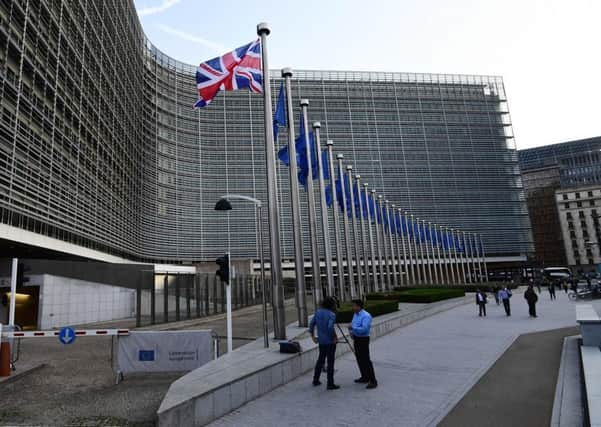Paris Gourtsoyannis: How Brexit could be over by Christmas


Despite what the government may claim, there was little evidence of any movement towards a Brexit deal in talks last week.
Theresa May’s speech was supposed to unblock a process gummed up by brinkmanship over money and irreconcilable differences on the role of European courts, but by the week’s end the smelly drain in Brussels was still gurgling away unhappily.
Advertisement
Hide AdAdvertisement
Hide AdMichel Barnier said he found the lack of progress “disturbing”, and there was so little to say about the issue of money that for a whole day negotiators didn’t meet at all.
Last night the Prime Minister made a last-minute dash to the Belgian capital for a dinner with Barnier and Jean-Claude Juncker ahead of a European summit later this week. The October European Council meeting was originally set as the target for “sufficient progress” to be made in negotiations on Northern Ireland, citizens rights, and yes, money.
But there is now little hope that EU leaders will give the UK the green light to finally begin talking about trade, making a mockery of Downing Street’s insistence that momentum is building towards a good Brexit deal.
Instead, all the signs are that the UK is picking up speed towards a tumble out of the EU without any deal at all. In fact, as the optimists said about both world wars, it could all be over by Christmas.
The public’s patience with the whole sorry mess is waning. The deeper we get into Brexit negotiations, the less anyone wants to know. It’s a difficult process full of messy, poorly understood compromises, and it’s taking place against a ticking clock.
Meanwhile, all the British public hears is how ill-suited the government is to managing the task. Since the election, on a good day the Prime Minister’s leadership abilities have been openly questioned. On the bad days, she is ridiculed. The Conservative Party is divided into factions based on which Cabinet minister should be sacked, Boris Johnson or Philip Hammond. How can the UK get agreement on a Brexit deal in Brussels if there isn’t even agreement on Whitehall?
This is a fairly simple proposition for voters to understand. The proportion of people telling YouGov that they think Brexit talks are going badly has risen from 34 per centr in March to 64 per cent. By a narrow margin, more people now think it was wrong to leave the EU. I’m sure you’ve felt it too – a lot of us are scunnered with Brexit.
Labour is hearing that message loud and clear. In June, Jeremy Corbyn found himself leading a party buoyed by the votes of Remainers whose cause he pretty ambivalent about. But he has moved to embraced Labour’s Remain supporters, and was more enthusiastic in proclaiming last week that he would vote to stay in the EU than he ever was in the last year’s referendum campaign.
Advertisement
Hide AdAdvertisement
Hide AdAmong his MPs, there is a growing willingness to talk about reversing Brexit altogether. At the last PMQs, Labour MPs bounced up and down peppering May with questions about legal advice rumoured to show that the UK can put Article 50 back in the bottle and stay in the EU – a crucial requirement for a referendum on the terms of the UK’s exit.
This has got backbench Conservatives nervous. The opposition could set the weather in a final parliamentary vote on the Brexit deal. The likes of John Redwood and Charlie Elphicke have stepped up their claims that the UK shouldn’t fear a no-deal scenario, and if more moderate Tory MPs are forced to choose between no-deal and no Brexit, it isn’t clear which side they would come down on.
After this week’s European Council meeting, the next opportunity to have trade talks signed off is in December. By then, the pressure on the government will be enormous.
The financial sector has said the end of the year is its witching hour for activating contingency plans in the event of a no-deal Brexit. That means shifting high-paid jobs and lucrative business to Europe to be guaranteed access to the single market. As this paper reports today, some of that work is already happening.
At universities, uncertainty over whether British academics will have to abandon their EU-funded research projects will force difficult decisions, with a key deadline to apply for support through the Horizon 2020 programme in December. Higher education is just one of the sectors heavily reliant on European nationals, who also face tough choices as they wait for certainty about their rights after Brexit. Last week Scottish MPs were briefed by Universities Scotland about instances where EU academics set to win millions of pounds worth of grants turned down the money and decided to return to their homelands instead.
And on farms, where decisions are often made 18 months in advance, the end of the year will force farmers to judge whether it’s worth growing and rearing produce for export markets that might be uneconomical after a no-deal Brexit.
Come December, if ministers still can’t answer those questions because talks in Brussels haven’t moved forward, it could be a no-deal Brexit by default. Without clarity, businesses and institutions will be forced to prepare for a worst-case scenario that the government has kept on the table as part of its negotiating strategy.
The last resort could become the only option, which would in itself see pressure increase on the government to follow through. The Chancellor refusal to spend millions of pounds preparing for a no-deal Brexit that the government says it is trying to avoid has already seen Mr Hammond branded an Eeyore by his more Tiggerish colleagues.
Advertisement
Hide AdAdvertisement
Hide AdMomentum is certainly building, but it isn’t clear that the government is in control of the direction of travel. It could be that, after months of phoney war, the British boys will be back from the Continent in time for Christmas.